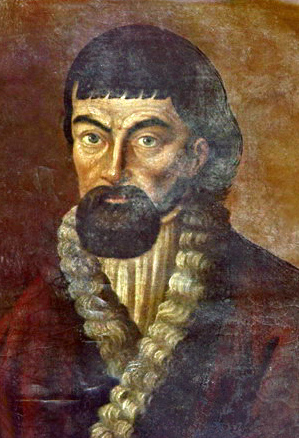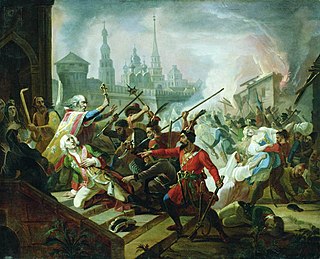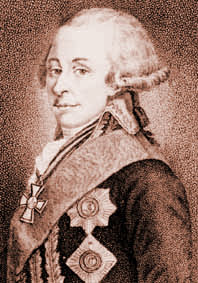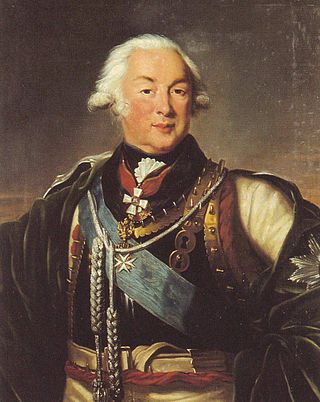
Yemelyan Ivanovich Pugachev was an ataman of the Yaik Cossacks and the leader of the Pugachev's Rebellion, a major popular uprising in the Russian Empire during the reign of Catherine the Great.
Salawat Yulayev was a Bashkir national hero who helped lead the Pugachev's Rebellion. He was also a poet and singer.

Pugachev's Rebellion of 1773–1775 was the principal revolt in a series of popular rebellions that took place in the Russian Empire after Catherine II seized power in 1762. It began as an organized insurrection of Yaik Cossacks headed by Yemelyan Pugachev, a disaffected ex-lieutenant of the Imperial Russian Army, against a background of profound peasant unrest and war with the Ottoman Empire. After initial success, Pugachev assumed leadership of an alternative government in the name of the late Tsar Peter III and proclaimed an end to serfdom. This organized leadership presented a challenge to the imperial administration of Catherine II.

Prince Dmitry Ivanovich Svyatopolk-Mirsky was an Imperial Russian Army general, a politician and a member of the princely Svyatopolk-Mirsky family.

Ivan Vladimirovich Tyulenev was a Soviet military commander, one of the first to be promoted to the rank of General of the Army in 1940.

The Battle of Kazan (1774) was a major battle during Pugachev's Rebellion. It took place on 12–15 July 1774 in Kazan, Russia, and the surrounding area. The first stage began in the morning of 12 July, when rebels under Yemelyan Pugachev defeated government troops and besieged them in the Kazan Kremlin. During the battle some government forces defected to the rebels' side. However, in the evening, tsarist forces under Johann Michelson reached Kazan and defeated the rebels in two battles which took place on 13 and 15 July, forcing Pugachev to retreat to Tsaryovokokshaysk and then to cross the Volga. Out of 25,000 and 15,000 rebels who participated in the first and last stages of the battle respectively, only 500 escaped.

Count Pavel Sergeevich Potemkin, sometimes spelled Potyomkin or Potiomkin was a Russian statesman, soldier, and writer.

Johann Hermann von Fersen was a Saxon-born infantry general who served from 1770 in the Imperial Russian Army.

Vitebsk Governorate was an administrative-territorial unit (guberniya) of the Russian Empire, with the seat of governorship in Vitebsk. It was established in 1802 by splitting Belarusian Governorate and existed until 1924. Today most of the area belongs to Belarus, the northwestern part to Latvia and the northeastern part to Pskov and Smolensk Oblasts of Russia.Together with the Vilna, Kovno, Grodno, Minsk, and Mogilev Governorates, it formed the Northwestern Krai. The provincial city was Vitebsk, the largest city was Dvinsk.

Count Ivan Petrovich Saltykov was a Russian field marshal, the governor-general of Moscow from 1797 to 1804, and owner of the grand estate of Marfino.

Baron Johann Möller-Sakomelsky was a General of the Russian Empire. An artillery expert, he gained fame during the Turkish Wars of the late 18th century.
Vasily Alexeyevich Kar was a Russian general chiefly noted for his defeat in the early stages of Pugachev's Rebellion. His defeat allowed the rebellion to grow into a major threat to the government of Catherine the Great until later army expeditions were able to suppress it. His family name is often transliterated in Western sources as Karr.

Ivan Ivanovich Zatevakhin was a Red Army Lieutenant general who commanded the Soviet Airborne Forces (VDV) from 1944 to 1946.

Ivan Vasilyevich Zaplatin was a major of Imperial Russian Army, a bakery butter producer, a deputy of the Second Imperial Duma from the Orenburg Governorate in 1907, who had "moderately progressive" political position. He was the founder of the Ural Union of butter-producing cooperatives (1910), that organized the export of Siberian and Ural butter to Europe. During the Kornilov affair in 1917, he was the commandant of the Tauride Palace and informed the Bolsheviks of the military actions of the Kornilov troops and commands of the headquarters of the Petrograd Military District.

Mikhail Dratvin was a Soviet lieutenant general. Dratvin's military career began when he was drafted into the army of the Russian Empire during World War I. He subsequently became an expert in the fields of military intelligence and signals, teaching at a number of Soviet military academies and acting as a senior military advisor to the government of China during the Warlord Era and the Second Sino-Japanese War. He fought in World War II and served as a functionary of the Soviet Military Administration in Germany at the conclusion of the war.
Jovan Samuilović Horvat de Kurtič, also referred to as Ivan Horvat, was a Russian general of Serbian origin who founded New Serbia in the modern Kirovohrad Oblast.

Ivan Egorovich (Georgievich) Shevich was a Russian-born Serb nobleman who was one of the leading fighting-generals, and one of the bravest, in the Russian Imperial army under the command of Mikhail Kutuzov and Emperor Alexander I in the war against Napoleonic France. His grandfather, Lieutenant-General Jovan Šević, led Serb colonists from the Habsburg Monarchy to Imperial Russia during the reign of Empress Elizabeth Petrovna. Ivan's victory against Napoleon at the Battle of Borodino in 1813 puts him in the first rank of Russian military heroes. Today his portrait hangs with other generals in the Military Gallery of the 1812 State Hermitage at St. Petersburg.
The Battle of Tsaritsyn was decisive confrontation between the Imperial Russian Army, commanded by Johann von Michelsohnen, and serf rebels, led by Yemelyan Pugachev. After Pugachev's victory in the Kazan, Michelsohnen was tasked with the suppression of the revolt, which occurred on August 21, 1774, near Tsaritsyn although the rebels outnumbered his forces. Afterward, the rebellion quickly collapsed. Pugachev himself escaped but was captured on September 14 and executed on January 10 the next year.

Ivan Petrovich Korchagin was a Soviet Army lieutenant general and a Hero of the Soviet Union.

Ivan Prokofievich Sivakov was a Red Army major general and a posthumous Hero of the Soviet Union.
















